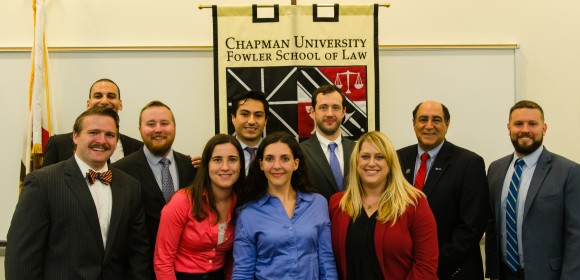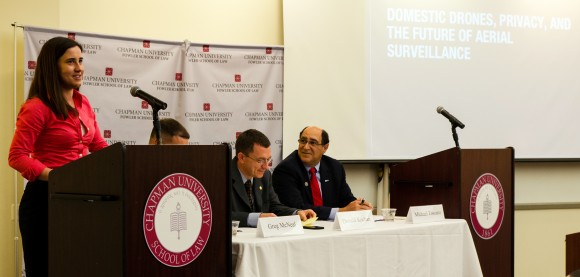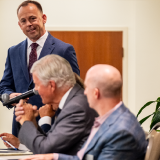Regulating Drones: What Is Our Expectation of Privacy?
November 18, 2014
Fowler School of Law students, faculty and visitors were privileged to hear from two drone experts at the panel discussion, “Domestic Drones, Privacy and the Future of Aerial Surveillance,” hosted by the Chapman Air and Space Law Society and Chapman Federalist Society on October 29, 2014.
“[Drone law] was something we thought would drive interest that really needs to be discussed. It is a new topic and there needs to be more law,” said Sarah Johnson, a Fowler Law 3L and president of the Chapman Federalist Society. “Promoting the topic will get more young lawyers in the field.”

(from left) Ali Bushra (JD ’14), Justin Mitchell (JD ’16), Cameron Miller (JD ’16), Sarah Johnson (JD ’15), Vicente Ayala (JD ’16), Megan Moghtaderi (JD ’16), Jeremy Talcott (JD ’16), Lorin Herzfeldt (JD ’16), Michael Toscano and Dr. Greg McNeal
The discussion, led by Fowler Law’s Associate Dean for Research and Faculty Development Donald Kochan, featured Michael Toscano, President and CEO of the Association for Unmanned Vehicle Systems International (AUVSI), and Dr. Greg McNeal, Associate Professor of Law at Pepperdine University School of Law.
“Professor McNeal and Mr. Toscano both underscored a valuable insight for our students and other attendees — the drones issue is rising in multiple areas of the law, their infiltration into multiple aspects of our society is inevitable, and lawyers need to be there to manage this complex and emerging technology.” - Donald Kochan, Associate Dean for Research and Faculty Development, Fowler School of Law
The discussion focused on privacy and accountability concerns that have been raised by both the government and private citizens. Opposition to the technological development of these unmanned aerial systems (UAS), or drones, came from Senator Dianne Feinstein (D-CA), who previously experienced an invasion of her privacy when a drone appeared outside her window. McNeal was quick to point out that this drone was actually a Pink Patrol helicopter, which is about six inches tall and one foot long, flown by a private citizen. While the Feinstein helicopter incident was ultimately not a threat to national security, McNeal noted that small remote control helicopters like the Pink Patrol are now regulated by drone legislation, a result of the Feinstein incident and support from organizations such as the American Civil Liberties Union (ACLU).
Lorin Herzfeldt, a 2L and one of the inaugural Executive Board members of the Chapman Air and Space Law Society, believes that students should be more interested in this area of law because it is so pervasive. “The Air and Space Law Society has the primary goal of providing a forum for law students to explore what really is a diverse and large number of future career options,” said Herzfeldt. “It isn’t a limited subject matter as some people might expect. It incorporates IP law, contract law, property law, administrative law, regulatory work, lobby work, and much more. Tonight’s presentation showed where young lawyers can be involved in shaping the future of the legal system to make room for technological advances.”
Much of the focus of the night was on how current drone legislation is overinclusive as to what a drone is and how to deal with Fourth Amendment concerns. “As Americans, the question boils down to an expectation of privacy,” explained Toscano.
Both McNeal and Toscano contend that this public fear of personal privacy violations is more fear-mongering by the ACLU and Senator Feinstein than a legitimate concern, as a drone with a camera is no different than a photographer with a telephoto lens, a police officer in a helicopter, or even a traffic light camera. Furthermore, Toscano explained that drones are extremely useful in non-public contexts, such as checking the structural safety of oil rigs or collecting soil and water samples in the middle of huge farms.

(from left) Sarah Johnson, President, Chapman Federalist Society; Dr. Greg McNeal, Associate Professor of Law at Pepperdine University School of Law; Donald Kochan, Associate Dean for Research and Faculty Development at Chapman University Fowler School of Law; and Michael Toscano, President and CEO of the Association for Unmanned Vehicle Systems International (AUVSI)
Even if there are privacy concerns, argued McNeal, “the great thing about technological advances is that technology can evolve in a way to protect privacy in a much more effective way than the bureaucratic process.” For instance, McNeal explained that drones used by law enforcement to conduct surveillance could have a recorded flight plan easily accessed for accountability purposes. In comparison, McNeal explained, there would be no record if a police officer conducting helicopter surveillance in a backyard marijuana operation chose to inappropriately turn his camera toward the open window of a sorority house.
Toscano stated that there are two things drones do very well: deliver a payload (such as a package ordered online) and provide situational awareness (such as going into a burning building to provide rescue and safety information).
Humans and drones can and do work well together, said Toscano, “because drones supply good information and when you give good information to smart people, they make good decisions.”
“If one lesson from the speakers hovered in the airspace after the event more than any other, it was that the savvy law student and lawyer will get their wheels on the runway of this technological revolution and start developing a command and understanding of the technology in a way that will give them a comparative advantage in legal practice as clients begin to demand drone-related legal services.” - Donald Kochan, Associate Dean for Research and Faculty Development
This story was excerpted from an article written by current Fowler School of Law 3L Ryan Anderson that originally appeared in the Fall 2014 issue of the Chapman Law Courier.
